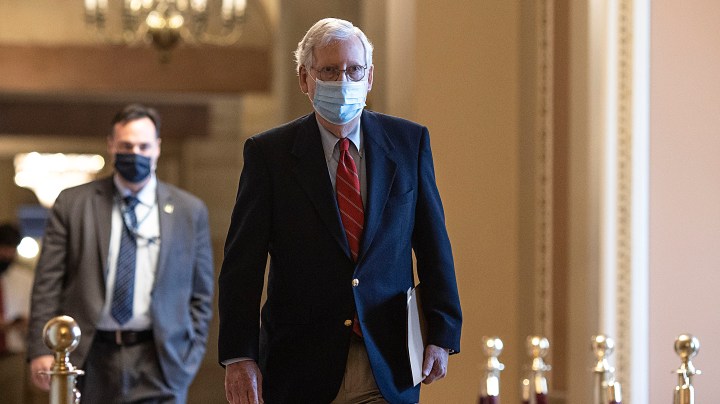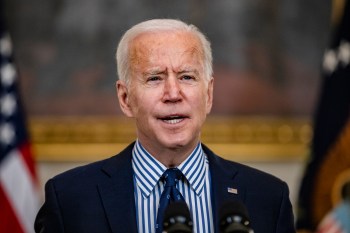
What’s included in Congress’ $900 billion COVID relief bill?

Under a pandemic relief plan agreed upon by Republicans and Democrats on Sunday night, the headline items are $600 checks to individuals making $75,000 a year or less and an additional $300 per week from the federal government in unemployment benefits for many.
Beyond that, what do we have?
To start, the bill continues a number of programs that were due to expire at the end of this year, including federal unemployment benefits for gig workers and for people whose state benefits have expired.
The legislation is also expected to extend an eviction moratorium and money for rental assistance.
Paycheck Protection loans for small businesses
There’s also money for the Paycheck Protection loan program for small businesses. That’s by far the biggest line item in the COVID relief plan: $284 billion to businesses to help keep their people on the payroll — grants if rules are met, loans if rules are not met.
“The greatest amount of damage, and the biggest amount of potentially irreversible damage to employment, is in the small business sector,” said Karen Petrou, co-founder and managing partner of the Washington-based economic consulting firm Federal Financial Analytics. “So getting these PPP loans back out to small businesses, including very small and minority-owned businesses, is critical to returning the economy to a sustained and more secure base of low- and moderate-income employment.”
This time around, though, PPP funding will see key changes. There was criticism of the initial rollout: some major restaurant chains and other big businesses took PPP money, and many small businesses — without established banking connections — got locked out in the initial rush. There was also fraud in the system.
Now, Democratic leaders say, modifications will target the money more to small businesses and independent restaurants.
“You rush out $649 billion, literally, you know, in a week, there are going to be disastrous mistakes, and there were in the first rollout,” Petrou said. “From what I’ve seen, this version of the program is a lot tighter, a lot better and it will really go to genuine small businesses.”
Listen to David Brancaccio’s full interview with Karen Petrou from the “Marketplace Morning Report”:
Senate Majority Leader Mitch McConnell said there will be a second draw for the hardest-hit small businesses — if they took PPP money in the initial round, they could be eligible to do so again.
Also, there’s expanded eligibility for nonprofits, local newspapers and TV and radio broadcasters.
More generally, when it comes to small business aid, the bill is expected to include $15 billion for movie theaters and live performance venues.
No direct aid for state and local governments
There’s a lot in this deal, but there’s also a lot missing, including the Republican-led effort to prevent businesses from getting sued for their responses to the coronavirus, and direct help for state and local governments. There’s a demonstrated need in that area, said Dan White, director of government consulting and public finance research at Moody’s Analytics.
“Based on the amount of tax revenues that have fallen and the amount that certain spending programs like Medicaid have increased, on the whole, we think states and local governments are going to need about $170 billion over the next year and a half, two years,” White said.
That will mean budget cuts elsewhere. But it could also mean higher taxes, especially for those living in the Northeast, White said.
“States and local governments have already cut significantly. I think we’ve lost about 1.3 million state and local government jobs since April,” he said. “That puts us to the lowest level of state and local government employment since about 2001. And so the questions that I’m getting from state and local government policymakers are not, you know, ‘what can we cut?’ It’s, ‘how can we raise revenues without hurting the the economic recovery?’ “
State and local governments will get at least something from the package as it stands now, including money through the Federal Emergency Management Agency, help for public transit systems and aid for education. White said, however, that there are lots of stipulations about how these subsets of money can be used — “it’s not something that they can use just to backfill budget shortfalls because the economy’s doing poorly.”
Listen to David Brancaccio’s full interview with Dan White from the “Marketplace Morning Report”:
Federal Reserve lending facilities
Lastly, the Federal Reserve was at the center of a major hurdle in negotiations before the weekend. Republican Sen. Pat Toomey of Pennsylvania insisted that there be language in the bill outlining what the Fed’s emergency lending powers will look like in the future. The Fed established a number of emergency lending programs during the pandemic.
Initially, Toomey wanted the bill to forbid the Fed from doing anything similar to that without Congressional approval. He compromised. So now the bill just says the Fed can’t recreate those exact same programs, and they expire at the end of this year.
Former Fed Chair Ben Bernanke issued a statement saying it was “vital” that the Fed’s ability to respond to a crisis “not be circumscribed.”
There’s a lot happening in the world. Through it all, Marketplace is here for you.
You rely on Marketplace to break down the world’s events and tell you how it affects you in a fact-based, approachable way. We rely on your financial support to keep making that possible.
Your donation today powers the independent journalism that you rely on. For just $5/month, you can help sustain Marketplace so we can keep reporting on the things that matter to you.


















